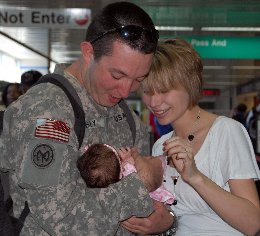 SPRINGFIELD, Ill., March 26, 2009 - Eighteen-year old Daphney Bell had a baby girl, Addilyn, in February, but something was missing -- Addilyn’s father. SPRINGFIELD, Ill., March 26, 2009 - Eighteen-year old Daphney Bell had a baby girl, Addilyn, in February, but something was missing -- Addilyn’s father.
Addilyn’s father, 21-year-old Spc. Dereck Bly of Shelbyville, Ill., was mobilized with the Effingham-based Company B, 2-130th Infantry in June 2008 and is part of the 33rd Infantry Brigade Combat Team (IBCT) that deployed to Afghanistan in the fall of 2008. Dereck found out his fiancé was pregnant the same day he was mobilized and left Illinois for training.
“We were shocked,” Daphney said with a smile. “He was excited, but he was also scared. There were a lot of different emotions all in one day.”
Just eight days after giving birth, Daphney learned what to expect when her fiancé comes home from deployment in Afghanistan at an Illinois National Guard Family Academy in Mattoon.
“I am trying to get information to help him when he comes home and help him make the transition easier,” Daphney said. “I know this won’t be easy for him and I just want to be able to help him in every way I can.”
Daphney and hundreds of families have taken advantage of a series of family academies throughout Illinois.
The academies include booths where families can get information from different agencies and classes on what the families should expect when their loved one returns home.
The academy provides an opportunity for families to meet experts to answer their questions and give them the tools and insight to ease the challenges of reintegration.
Reintegration is a process servicemembers endure as they transition from Soldier back to citizen following mobilization.
While Soldiers receive reintegration training upon returning from deployment, families need to receive similar information prior to the servicemember returning home.
Family academies were started in 2008 to teach families about the information the Soldier will learn when they attend reintegration training.
Col. Michael Haerr of Eureka, Ill., Deputy Commander of the 33rd IBCT, said the academies are extremely important for the families to understand what to expect after deployment. He said it is also imperative to meet others who are experiencing similar issues.
“It’s important for the families to come out and support each other,” Haerr said. “Just like Soldiers have a network, families need to build a similar network and understand they are not alone. This is the first time many people are separated from their loved ones and they are all learning to cope.”
The Illinois National Guard has taken a proactive approach by reaching out to the families to make sure the Soldiers are aware of what services and help are available when they come home.
Maj. Gen. Dennis Celletti of Springfield, Assistant Adjutant General of the Illinois National Guard, understands that Soldiers receive this information when they get back to the states, but said reintegration is not what they are thinking about.
“We give the same information to the Soldiers, but they’re not listening to the briefings because they only have one thing on their mind and that’s coming home to (their family),” Celletti said.
Reintegration is not just a program for servicemembers after a deployment, it is something the entire family must undergo as everyone readjusts to changes that have happened during the course of the servicemember’s deployment. This is one of the many ways the Illinois National Guard is trying to help families of deployed men and women who are sometimes fighting their own battles at home while their Soldier is fighting a war overseas.
|